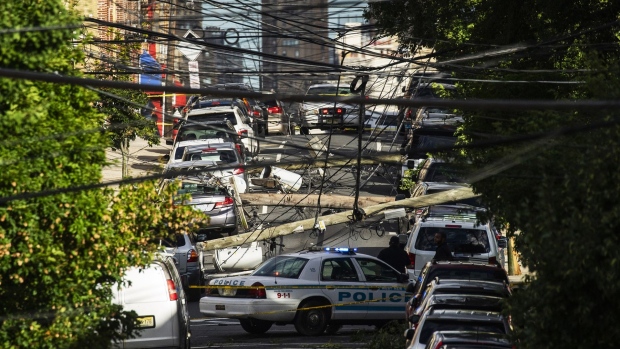Aug 6, 2020
For Many New Yorkers, WFH Now Means Working Without Electricity
, Bloomberg News

(Bloomberg) -- Working from home during a pandemic is hard enough. Now many across the Northeast are being forced to do it without electricity.
More than 1.4 million homes and businesses from New York to Delaware are still without power after Tropical Storm Isaias battered the region. In one wealthy enclave of New York City, people are charging their laptops in idling cars. On Long Island, Audis are lining up outside of a 7-Eleven in search of service. And in New Jersey and Connecticut, families have decamped to hotels or friends’ houses to use the internet.
“It couldn’t happen at a worse time,” said Bill McCormick, who sells sports equipment and had to work out of a Starbucks parking lot. The Middletown, Delaware, resident lost power Tuesday morning, as he was working on an important proposal. He was able to finish the job with his phone after accessing the cafe’s internet service.
Days after Isaias left millions of customers in the dark in the biggest storm-related outage since Hurricane Sandy in 2012, utilities are still trying to restore power.
In the Riverdale section of the Bronx, where more than 1,000 homes and businesses were still without power on Thursday, people sat in parked cars in the driveways of stately homes, charging phones and laptops. The smell of diesel hung in the air, thanks to private generators keeping the lights on in some homes.
There, the local Starbucks could provide no refuge. The chain’s Riverdale location, typically crowded with people taking advantage of free WiFi, removed all its tables shortly after the start of the pandemic, making it useless to telecommuters.
WiFi Scavengers
On Long Island, Chadwick Forbes, who runs a Twitter page focused on professional football, has been tapping into the connectivity of a 7-Eleven store in Roslyn. He’s not the only one.
“People were pulling in the lot, honking. There’s probably 15 spots, and they were all full,” he said. “You can tell everyone’s trying to do the same thing.”
Udo Tobben doesn’t have that option. A senior program analyst in Plainview, New York, he needs his computer to test software, so he’s not getting any work done. Instead he’s cleaned the yard and has been keeping mobile phones charged by driving around the area.
The local utility, PSEG Long Island, has said the area will have service by Friday, “but we have no idea how reliable this is,” he said.
One challenge utilities face is that, because the storm impacted nearly every state along the East Coast, response crews have been forced to stay home to assess damage before heading out to neighboring states to help, said Scott Aaronson, vice president of security and preparedness for the Edison Electric Institute, a trade group. The pandemic has also slowed down the work.
“Utilities have reduced their own staff and are increasingly relying on neighbors,” said James Slevin, president of the Utility Workers Union of America. “This storm wasn’t nearly the size of Sandy and yet it’s had just as much impact on customers. That shows they aren’t keeping up with maintenance with their own crews.”
Ellen Rader Smith, an occupational therapist in Montville Township, New Jersey, has been told not to expect electricity until next Tuesday.
‘We’re Refugees’
Smith initially tried working at the home of a friend who also was affected by the outage but had a generator. Yet there was no WiFi, so she couldn’t access some key files. On Thursday she was visiting another friend who wasn’t affected by the outage, and on Friday she may find somewhere else so she doesn’t wear out her welcome.
“We’re refugees,” said Smith. This year has already been difficult, adjusting to all the restrictions and uncertainty of Covid-19, “but even that sounds better than where we are now.” The local utility Jersey Central Power & Light didn’t return a phone call.
Josh Tammaro, who works in public relations, has been staying at family’s home in Portland, Connecticut during the pandemic. When the lights went out, he and his parents and siblings relocated to a hotel, where they’re sharing a single room.
“It’s a little crazy,” he said. “It reminds me of the open-office space we have up in Boston.”
©2020 Bloomberg L.P.


